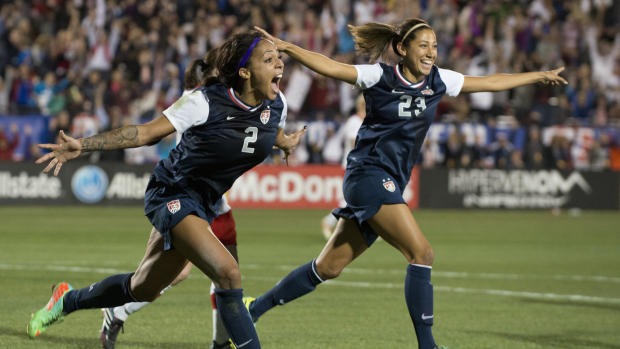Female soccer stars cashing in on endorsements
Being a professional athlete isn't always lucrative, especially for female athletes, so several of this year's national women's soccer team players are making strategic investments in their image, and cashing in at just the right time, reports CBS News correspondent Jericka Duncan.
Millions are watching Alex Morgan on the field, but millions more will see her as the face of McDonalds, Degree and Nationwide Insurance.
As the young, vibrant forward for the U.S. Women's National Team (USWNT), 25-year-old Morgan is one of only a few women who can make a living playing professional soccer. Her skills, and image, will earn her more than $1 million dollars this year.
"I think Alex is marketable because she scores goals," her agent Dan Levy said. "What comes with that as well is someone that really enjoys people, enjoys connecting with her fans, and companies and brands see that."
Morgan said she wouldn't score any of the off-the-field deals if she wasn't putting in the work on the field.
"I remember that every single day. I know that that's my priority and that's what I love to do," she said.
The players love it, but it may not be so easy to make a living out of it. USWNT players made anywhere from just $6,800 to $37,800 this season.
"As much as you want from an altruistic sense for women's professional leagues and sports to exist and thrive, that doesn't put butts in the seats," Sports Illustrated senior writer Grant Wahl said.
He said it's still a struggle for female athletes to win endorsements.
Abby Wambach for example, the leading scorer of international goals in all of soccer men or women, made $190,000 last year. That's about what Argentinian star Lionel Messi makes in one day.
One reason, said Wahl, is endorsements are closely tied to profits; fill stands, and you can sell ads.
"It has been good and encouraging for the sport and for women's soccer to see more money coming in, in recent years, but it's been a long process and a lot of women really fought hard for that," Wahl said.
Mia Hamm, who joined the national soccer team at 15 years old, is a player who did just that. Hamm became a household name in 1999, when she helped win a World Cup at home in front of 40 million television viewers.
The lucrative sponsorships followed, including the iconic "Anything You Can Do" Nike commercial with Michael Jordan.
Levy, who also represents Hamm, said her entire team was relatable.
"They understood that they were inspiring young people and they took the time to do that," he said.
But Wahl acknowledged there are other reasons why companies find these players attractive.
"How you look seems to matter when it comes to endorsement deals and getting people to pay more money for things," he said.
And while he said he doesn't think it's fair, for women, it matters more.
Fair or not, in the world of sports, both the endorsements and the opportunities can be short lived.
"I want to have a long career of playing soccer and that's always my priority," Morgan said. "I'll be playing as long as my body allows me to play at this level I think."
More and more, people are tuning in to watch women's soccer. Last week, 5.7 million viewers saw team USA play China. That set a record for Fox Sports, and was one of the largest audiences in women's soccer history. But keep in mind, close to 16 million people watched the U.S. men play Ghana in the "Round of 16" in last year's World Cup.
